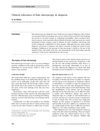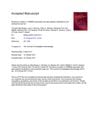 4 citations,
November 2021 in “Cancers”
4 citations,
November 2021 in “Cancers” The document concludes that understanding and managing hair loss in cancer patients is important, and more research is needed for better treatments.
 4 citations,
January 2021 in “Dermatologic Therapy”
4 citations,
January 2021 in “Dermatologic Therapy” AI is effective in diagnosing and treating hair disorders, including detecting hair loss and scalp conditions with high accuracy, but it should supplement, not replace, doctor-patient interactions.
 September 2023 in “Medicine”
September 2023 in “Medicine” The research suggests immune system changes and specific gene expression may contribute to male hair loss, proposing potential new treatments.
 April 2023 in “Journal of Investigative Dermatology”
April 2023 in “Journal of Investigative Dermatology” People who had severe COVID-19 are more likely to experience hair loss.
 January 2015 in “Springer eBooks”
January 2015 in “Springer eBooks” Chronic kidney disease can cause hair loss, which may be related to zinc deficiency or certain medications, and sometimes hair grows back when the underlying issue is treated.
 29 citations,
March 2001 in “Clinics in Dermatology”
29 citations,
March 2001 in “Clinics in Dermatology” Steven Kossard classified lymphocyte-related hair loss into four patterns, each linked to different types of baldness.
27 citations,
January 2015 in “International Journal of Trichology” The supplement helps improve hair growth and reduce hair shedding.
 15 citations,
July 2002 in “Clinical and Experimental Dermatology”
15 citations,
July 2002 in “Clinical and Experimental Dermatology” Hair microscopy is useful for diagnosing certain hair loss conditions but has limitations and must be interpreted carefully.
 9 citations,
January 2017 in “Annals of Dermatology”
9 citations,
January 2017 in “Annals of Dermatology” The study found genetic differences related to hair development that may explain hair loss in a patient with Trichorhinophalangeal syndrome type I.
1 citations,
June 2021 in “Singapore Medical Journal” Dutasteride and finasteride can help increase hair growth gene expression but need further improvement.
April 2023 in “Journal of Investigative Dermatology” Aminoacridine and Abemaciclib, especially combined with Minoxidil, show promise for treating hair loss.
 November 2011 in “Informa Healthcare eBooks”
November 2011 in “Informa Healthcare eBooks” Environmental, chemical, mechanical, and personal health factors can all damage hair and contribute to hair loss or changes in hair quality.
 23 citations,
December 2020 in “Frontiers in Cell and Developmental Biology”
23 citations,
December 2020 in “Frontiers in Cell and Developmental Biology” Gene network oscillations inside hair stem cells are key for hair growth regulation and could help treat hair loss.
 3 citations,
June 2023 in “Journal of dermatological treatment”
3 citations,
June 2023 in “Journal of dermatological treatment” Regrowing scalp hair improves quality of life and reduces anxiety and depression in severe alopecia areata patients.
 1 citations,
July 2016 in “British Journal of Dermatology”
1 citations,
July 2016 in “British Journal of Dermatology” Men with a certain type of hair loss often use facial moisturizers, and a specific antibiotic treatment may help another hair condition.
 June 2023 in “JAAD international”
June 2023 in “JAAD international” Patients with skin of color are more likely to use supplements for hair loss than Caucasian patients, but the effectiveness of these supplements is uncertain and they can be expensive.
 June 2023 in “Skin Research and Technology”
June 2023 in “Skin Research and Technology” The supplement with amino acids, iron, selenium, and marine hydrolyzed collagen improved hair growth more than drug treatment alone, with most people tolerating it well.
 May 2023 in “Brazilian Journal of Animal and Environmental Research”
May 2023 in “Brazilian Journal of Animal and Environmental Research” Photobiomodulation effectively treats hair loss in dogs with black hair follicular dysplasia.
 January 2022 in “Springer eBooks”
January 2022 in “Springer eBooks” Platelet-rich plasma therapy helps increase hair thickness and slow hair loss.
 499 citations,
September 2011 in “Cell”
499 citations,
September 2011 in “Cell” Fat-related cells are important for initiating hair growth.
 11 citations,
September 2014 in “International Journal of Molecular Sciences”
11 citations,
September 2014 in “International Journal of Molecular Sciences” Mycophenolate helps reverse hair loss effects caused by IFN-γ by activating a key hair growth pathway.
 January 2022 in “Indian journal of dermatopathology and diagnostic dermatology”
January 2022 in “Indian journal of dermatopathology and diagnostic dermatology” Women with diffuse hair loss often have lower iron and vitamin D levels, but their thyroid function is typically normal.
July 2022 in “Journal of Investigative Dermatology” Scalp clarifying shampoo can help reduce hair loss and improve hair volume.
 125 citations,
September 2001 in “The FASEB Journal”
125 citations,
September 2001 in “The FASEB Journal” Stress can cause hair loss by negatively affecting hair follicles and this effect might be reversed with specific treatments.
 47 citations,
December 2006 in “Therapy”
47 citations,
December 2006 in “Therapy” The dietary supplement helped increase hair growth in women with hair loss.
 10 citations,
December 2021 in “Frontiers in cell and developmental biology”
10 citations,
December 2021 in “Frontiers in cell and developmental biology” Glypican-1 is important for blood vessel growth in hair follicles and could help treat hair loss.
 5 citations,
January 2021 in “Skin appendage disorders”
5 citations,
January 2021 in “Skin appendage disorders” Smoking is linked to more hair loss and premature graying compared to nonsmokers.
 108 citations,
July 2004 in “American Journal of Pathology”
108 citations,
July 2004 in “American Journal of Pathology” Stress increases a factor in mice that leads to hair loss, and blocking this factor may prevent it.
 10 citations,
November 2017 in “Journal of Investigative Dermatology”
10 citations,
November 2017 in “Journal of Investigative Dermatology” A mutation in the FAM83G gene is linked to skin and hair abnormalities in two related individuals.
 8 citations,
September 2017 in “Journal of Natural Medicines”
8 citations,
September 2017 in “Journal of Natural Medicines” Applying an extract from Perilla frutescens helps hair grow and fights the effects of hair loss hormones.


























